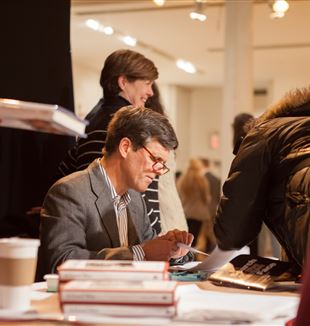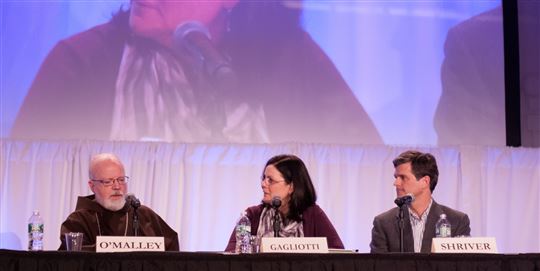
The Gift of Disability
"To be fully human is to welcome the other who is different." Cardinal Sean O'Malley, Timothy Shriver and Jean Vanier speak on identity and disability at the 2015 New York Encounter.Saturday afternoon the anticipation in the audience was palpable as everyone waited for the next speakers to take the stage. It was clearly the all-star lineup that was the at the heart of their waiting: Cardinal Sean O’Malley, Archbishop of Boston–by now an old friend of the Encounter; Timothy Shriver, Chairman of the Special Olympics; and (present via-video) Jean Vanier, the founder of the L’Arche communities, considered by many to be a living saint. As the speakers walked onto the stage, they were greeted by raucous applause even before they could even say a word.
Even through a television screen, Vanier’s passion and deep tenderness for man were extraordinarily evident, almost tangible. He began by simply stating what, in his mind, is the most adequate source of the dignity of the person: his individual conscience, his heart, which is the capacity of the human person to recognize love, to know truth, and to follow an ideal. It was the first of these capacities, the recognition of love, that Vanier focused on constantly in his interview. In a gentle but authoritative tone, Vanier expressed that the most important experience for any human being is to recognize that he is loved, that he “is more beautiful than he could ever believe.”
“The Word became Flesh,” he reminded the audience. He told stories of his disabled friends, Eric and Pauline, with whom he understood that the person only realizes their true worth in tenderness, kindness, and care that is expressed through the body, through touch, and through a gaze. “To be fully human,” he said, “is not to know more than the others. To be fully human is to welcome the other who is different.” He gave his testimony with his eyes as much as with his words, that we only become fully human in the relationship with another person who loves us.
This insight was also the refrain of Cardinal O’Malley and Timothy Shriver’s contributions: we gain more from the disabled and the poor than they gain by our “help.” Cardinal O’Malley recalled the astonishment of young people in his diocese coming back from mission work, after they saw people who were destitute, yet so much happier than those dwelling in bourgeois comfort at home. O’Malley added to the beautiful paradox of his message, “It is the poor who are often the most generous, most open to helping others, and most willing to be in relationship.”
Shriver recounted that when he meets people and they find out he is involved in Special Olympics they tell him how good of a person he is, how much he is helping. Instead, Shriver said, such a response is only possible for those who have never shared life with the disabled. In actually working and remaining with the disabled Shriver was able to discover that their infectious joy and honesty gave him more than he could ever give them. He recalled watching a race in which a girl with Down syndrome came in third place, by “normal” standards a disappointment. Instead this girl turned to her parents and raised her arms triumphantly. “In that moment,” Shriver recalled, “I wanted to be like her.” Her passion, and the fearlessness with which she lived became completely attractive for Shriver. He does not do this work with the Special Olympics because it is his “duty,” but because in doing it, he is able to discover his true self.
Cardinal O’Malley described how he was afraid of those with Down Syndrome as a child and that this changed when he visited family friends in Ohio who were welcoming handicapped children into their home. “It was like a love bomb going off in the middle of their family,” the Cardinal said, smiling. Shriver added that we are afraid of disability because for us, modern men, it represents failure. With striking honesty, Shriver spoke of his aunts and uncles—the Kennedy’s—whose upbringing was full of faith and devotion, but also full of competition and ambition. Among the tremendously successful members of that family was Rosemary, who had an intellectual disability. Shriver recalled being with his Aunt Rosemary and seeing the pain of rejection that comes when worth is measured by achievement. Without making any excuses he described the way that Rosemary was a light to her powerful siblings, teaching them a lesson of inclusion and the need to ask for help. In each of their stories, the speakers made it clear that a new gaze on the disabled is not the result of a moral resolution. A new gaze begins with an encounter that helps us to recognize our own limits, our need. Thus, in a mysterious way our limits are not the final word on life; our identity is discovered in belonging to another, being taken care of by another. “To understand our humanity,” the Cardinal said, “is to understand our dependence.”
The applause went on for so long after the meeting that the moderator had to ask the audience to stop their applause so that the coordinators could make their usual announcements. After the brief announcement, the applause continued again. What happened in the North Theater was not a lecture on the morality of how to treat the disabled, what happened was the overwhelming witness of men who have been transformed by the love for which every human limit cries out. In all of talks of the North theater, in the smaller talks and meetings in the South theater, in the shared coffees, in the dining hall, and cigarettes shared on the sidewalk, in every nook and cranny of the Encounter, there were glimpses of that transformative love; what else could explain our joy?